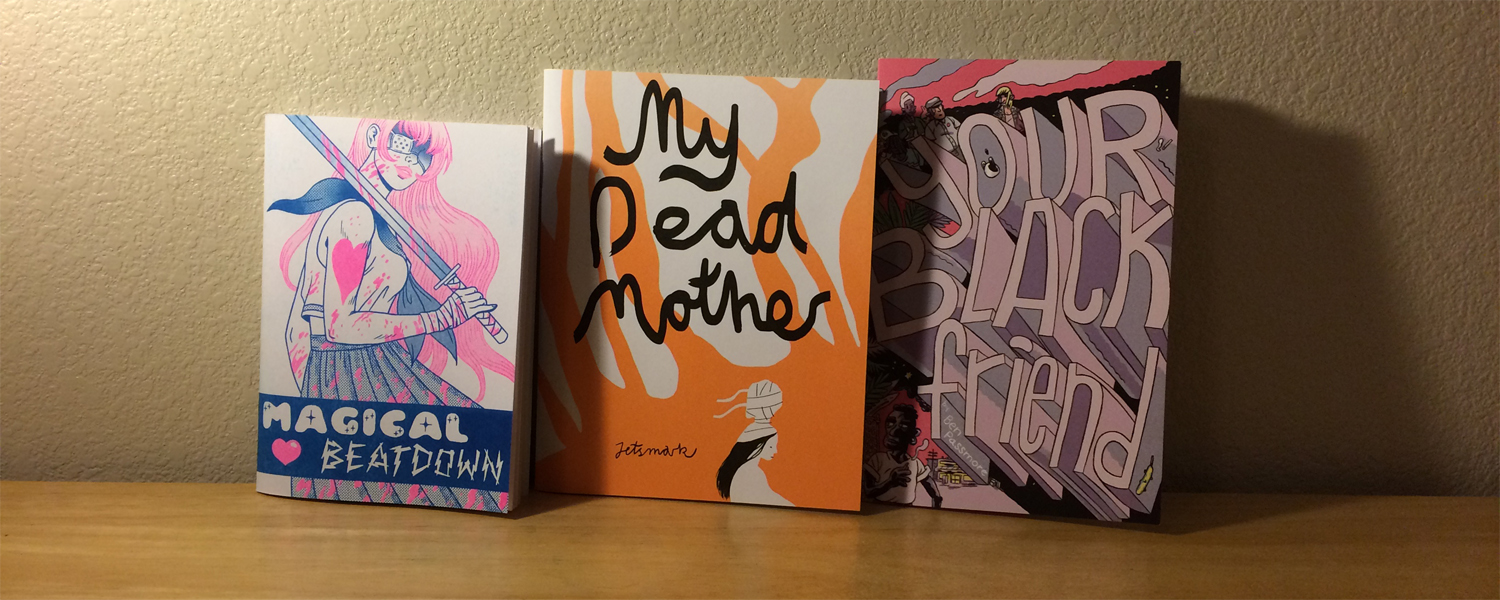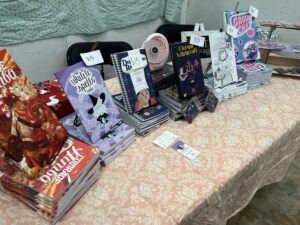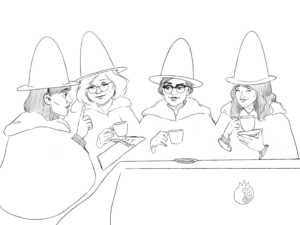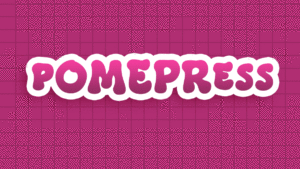It’s a shame that while comics seem to just get better and better, everything else in America seems poised to get worse. Oh, well. Here are some comics I enjoyed over the past month.
My Dead Mother – Clara Jetsmark

Serious Agau just wants to study for an upcoming exam but she has two problems. One is her easily-bored friend Kitty, who won’t stop talking about boys. The other is the head of her dead mother, who won’t stop screaming. But will a trip to the local medicine man actually help either? (He’s kind of creepy…) Nowhere near as grim (or auto-biographical) as you might guess, My Dead Mother is actually a charming fable about magic-gone-awry in an idyllic island town. Well, okay, the magical mistake does involve a corpse’s head being transplanted on top of her living daughter’s, but this set-up is the extent of the comic’s morbidity. At its core, Jetsmark’s story is a light-hearted comedy and by its end, everyone has gotten what they want without much fuss.
Equally relaxed is Jetsmark’s artwork, which blends the casualness of observational sketch with the practiced dynamism of contemporary illustration (Sam Alden and Eleanor Davis would both be good reference points here). Part of the magic is her ability to include just the right amount of detail in any given scene. Throughout MDM, Jetsmark manages to convey realistic action without ever belaboring her drawings. Often, she renders hands as nothing more than loose bundles of parallel lines, but I didn’t even notice until the 3rd read-thru because each panel functions so convincingly as a whole.

Which, of course, is the other half of the equation — her deft guidance of the viewer’s eye. Composition is key here, with Jetsmark arranging objects in each frame to attract the appropriate amount of the reader’s attention. But perhaps equally important is her skillful use of an orange mid-tone fill. By shifting the color around panel to panel (from figure, to foreground, to background, to figure again), she keeps the reader’s focus always on the move. Thus, rather than sinking into dull stability, her carefully balanced drawings hum with life. Powerful witchcraft, indeed.

For those interested in seeing more of Jetsmark’s art, you can check out this comic she did with Tom Kaczynski for The Nib. My Dead Mother can be purchase from Uncivilized Books and, of course, the artist has a tumblr page as well.
Magical Beatdown vol.2 – Jenn Woodall

If you’ve ever wished for the power to make a catcalling asshole shut up, Jenn Woodall has your back. And if you’re tired of being nice about it, she might even be a step ahead of you. Street harassment becomes the target of mahou shoujo justice in Magical Beatdown, Woodall’s mini-comic series about a Japanese teenager striking back against misogynist dickheads. In vol.2, the latest (and apparently third) installment, we find that heroine Fujiko’s community service has started to gain media attention, but this coverage isn’t the deterrent she might have hoped it’d be. Instead, she’s challenged to a midnight brawl on live television, by a gang leader rudely talking over a female reporter. Dutifully (if grudgingly), she shows up at the park to magically transform and beat the shit out of the assembled men.

Although, “beat the shit” doesn’t exactly capture it. Like a good steak, Fujiko’s justice is bloody and shockingly pink. In one grisly instance, she grabs an attacker’s tongue through his neck and then pulls off his jaw. In another, she weaponizes that same jaw to kill-shot his companion. As for pinkness, I mean that literally. Magical Beatdown is riso-printed in two colors of ink, with the first half entirely in blue. But, during Fujiko’s genre-mandatory transformation sequence, everything switches to pink. So, not only does Fujiko get a costume change at the book’s midway point, but the entire universe of the comic becomes overwhelmed feminine power on a meta-level. It’s a clever trick and it works well.

If I’m allowed a small gripe, I did find the comic’s Japanese setting distractingly hollow. What little we see of Fujiko’s life is furnished barely, and consists mostly of cliches (e.g. sailor uniforms, noodles, Power Rangers and Mothra on TV). On the one hand, I understand that this is part of the homage. The manga series that inspired Woodall are set in Japan, after all, and Sailor Moon wears sailor fuku. But on the other hand, I’d argue that this sort of cathartic fantasy is obviously personal on some level, and a few particulars borrowed from the real world might have made it more vivid. All the same, Magical Beatdown was a fun read for me. Although it’s probably most satisfying for people with direct experience of the shitty behavior it swings a nail-studded bat at.
Here are some links to volumes 1, 1.5 and 2 of Magical Beatdown. More of Woodall’s illustration work can be found in her portfolio.
Your Black Friend – Ben Passmore

It would be the easiest thing in the world to spend this whole review talking about Passmore’s skill as a cartoonist: His brushy linework gives his drawings a fun bounce and his conversational writing style is full of witty observations. His use of narration makes the reader feel like they have an especially smart friend giving them a backstage tour of the world. He has a good eye for minutiae: quirks of dress, props and place make even background characters memorable. And his digital color palette is beautiful, centered around subdued purples and off-yellows, but also winding through rose pinks, moss greens and pale blues.

All of this combined makes Your Black Friend a joy to read aesthetically. But (and of course there was a “but” coming), that doesn’t feel like the right focus here. It’s too easy (and suspiciously pleasurable) to compliment the pointing finger rather than following its direction. I wouldn’t say it’s wrong to strip the experience of art from its subject matter. But, it is wrong to treat all art as interchangeable morsels for consumption. The only respectful response to earnest expression is to listen seriously.

Your Black Friend is a meditation on the experience of American blackness and the frustration that inherently comes from friendship with white people in a racist society. It’s a comic about the world and ultimately it wants your focus there. Addressed directly to white people, and especially to those of us who might imagine we already “get it,” Your Black Friend doesn’t so much question the existence of our sincerity as its precise value. What, exactly, is our friendship worth if we won’t be honest about complicated realities? What is it worth if we can’t challenge our habits, our impulses, and maybe even our sense of “safety”? To either divert attention from this for too long, or attempt to paraphrase Passmore’s words (even in a complementary manner) seems disrespectful — especially because not only was Passmore patient enough to draw this comic, he was generous enough to make it at least a little funny. He really didn’t have to do either.

So, read it. It’s good (and short anyway).
Your Black Friend can be purchased as a physical book from Silver Sprocket; a digital copy can also be found by pledging to Passmore’s Patreon. I wrote about another comic of his for POME a while back and even more of his work in general can be found on his personal site.




